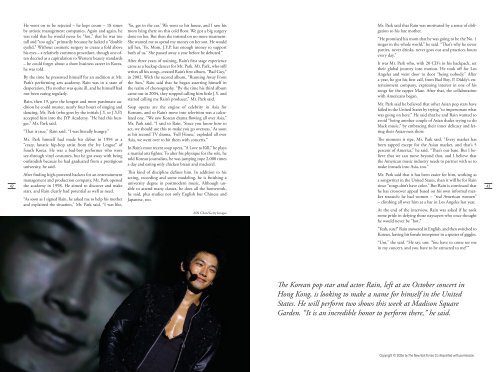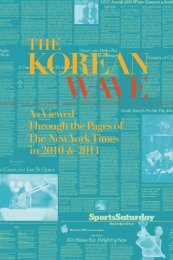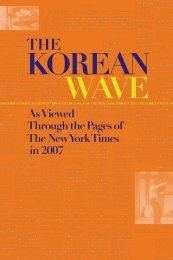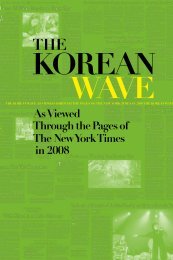The Korean Wave 2006 - Korean Cultural Service
The Korean Wave 2006 - Korean Cultural Service
The Korean Wave 2006 - Korean Cultural Service
Create successful ePaper yourself
Turn your PDF publications into a flip-book with our unique Google optimized e-Paper software.
42<br />
He went on to be rejected – he kept count – 18 times<br />
by artistic management companies. Again and again, he<br />
was told that he would never be “hot,” that he was too<br />
tall and “too ugly,” primarily because he lacked a “double<br />
eyelid.” Without cosmetic surgery to create a fold above<br />
his eyes – a relatively common procedure, though one often<br />
decried as a capitulation to Western beauty standards<br />
– he could forget about a show business career in Korea,<br />
he was told.<br />
By the time he presented himself for an audition at Mr.<br />
Park’s performing arts academy, Rain was in a state of<br />
desperation. His mother was quite ill, and he himself had<br />
not been eating regularly.<br />
Rain, then 19, gave the longest and most passionate audition<br />
he could muster, nearly four hours of singing and<br />
dancing. Mr. Park (who goes by the initials J.Y. or J.Y.P.)<br />
accepted him into the JYP Academy. “He had this hunger,”<br />
Mr. Park said.<br />
“That is true,” Rain said. “I was literally hungry.”<br />
Mr. Park himself had made his debut in 1994 as a<br />
“crazy, lunatic hip-hop artist from the Ivy League” of<br />
South Korea. He was a bad-boy performer who wore<br />
see-through vinyl costumes, but he got away with being<br />
outlandish because he had graduated from a prestigious<br />
university, he said.<br />
After finding high-powered backers for an entertainment<br />
management and production company, Mr. Park opened<br />
the academy in 1998. He aimed to discover and make<br />
stars, and Rain clearly had potential as well as need.<br />
“As soon as I signed Rain, he asked me to help his mother<br />
and explained the situation,” Mr. Park said. “I was like,<br />
‘Yo, get in the car.’ We went to his house, and I saw his<br />
mom lying there on this cold floor. We got a big surgery<br />
done on her. But then she insisted on no more treatment.<br />
She wanted me to spend my money on her son. He would<br />
tell her, ‘Yo, Mom, J.Y.P. has enough money to support<br />
both of us.’ She passed away a year before he debuted.”<br />
After three years of training, Rain’s first stage experience<br />
came as a backup dancer for Mr. Park. Mr. Park, who still<br />
writes all his songs, created Rain’s first album, “Bad Guy,”<br />
in 2002. With the second album, “Running Away From<br />
the Sun,” Rain said that he began asserting himself in<br />
the realm of choreography. “By the time his third album<br />
came out in 2004, they stopped calling him little J.Y. and<br />
started calling me Rain’s producer,” Mr. Park said.<br />
Soap operas are the engine of celebrity in Asia for<br />
<strong>Korean</strong>s, and so Rain’s move into television was a calculated<br />
one. “We saw <strong>Korean</strong> drama flowing all over Asia,”<br />
Mr. Park said. “I said to Rain, ‘Since you know how to<br />
act, we should use this to make you go overseas.’ As soon<br />
as his second TV drama, ‘Full House,’ exploded all over<br />
Asia, we went over to hit them with concerts.”<br />
In Rain’s most recent soap opera, “A Love to Kill,” he plays<br />
a martial arts fighter. To alter his physique for the role, he<br />
told <strong>Korean</strong> journalists, he was jumping rope 2,000 times<br />
a day and eating only chicken breast and mackerel.<br />
This kind of discipline defines him. In addition to his<br />
acting, recording and some modeling, he is finishing a<br />
university degree in postmodern music. Although unable<br />
to attend many classes, he does all the homework,<br />
he said, plus studies not only English but Chinese and<br />
Japanese, too.<br />
MN Chan/Getty Images<br />
Mr. Park said that Rain was motivated by a sense of obligation<br />
to his late mother.<br />
“He promised his mom that he was going to be the No. 1<br />
singer in the whole world,” he said. “That’s why he never<br />
parties, never drinks, never goes out and practices hours<br />
every day.”<br />
It was Mr. Park who, with 20 CD’s in his backpack, set<br />
their global journey into motion. He took off for Los<br />
Angeles and went door to door “being nobody.” After<br />
a year, he got his first call, from Bad Boy, P. Diddy’s entertainment<br />
company, expressing interest in one of his<br />
songs for the rapper Mase. After that, the collaboration<br />
with Americans began.<br />
Mr. Park said he believed that other Asian pop stars have<br />
failed in the United States by trying “to impersonate what<br />
was going on here.” He said that he and Rain wanted to<br />
avoid “being another couple of Asian dudes trying to do<br />
black music,” by embracing their inner delicacy and letting<br />
their Asian-ness show.<br />
<strong>The</strong> moment is ripe, Mr. Park said. “Every market has<br />
been tapped except for the Asian market, and that’s 5<br />
percent of America,” he said. “That’s our base. But I believe<br />
that we can move beyond that, and I believe that<br />
the American music industry needs to partner with us to<br />
make inroads into Asia, too.”<br />
Mr. Park said that it has been easier for him, working as<br />
a songwriter in the United States, than it will be for Rain<br />
since “songs don’t have color.” But Rain is convinced that<br />
he has crossover appeal based on his own informal market<br />
research: he had women – “real American women”<br />
– climbing all over him at a bar in Los Angeles last year.<br />
At the end of the interview, Rain was asked if he took<br />
some pride in defying those naysayers who once thought<br />
he would never be “hot.”<br />
“Yeah, sure!” Rain answered in English, and then switched to<br />
<strong>Korean</strong>, leaving his female interpreter in a sputter of giggles.<br />
“Um,” she said. “He say, um: ‘You have to come see me<br />
in my concert, and you have to be attracted to me!’”<br />
43<br />
<strong>The</strong> <strong>Korean</strong> pop star and actor Rain, left at an October concert in<br />
Hong Kong, is looking to make a name for himself in the United<br />
States. He will perform two shows this week at Madison Square<br />
Garden. “It is an incredible honor to perform there,” he said.<br />
Copyright © <strong>2006</strong> by <strong>The</strong> New York Times Co. Reprinted with permission.





